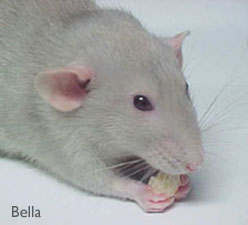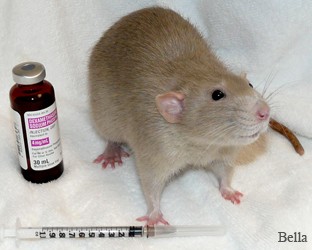Giving Medications
It is not unusual for a rat to have to take some form of medication during its lifetime.
Your vet will help you decide on which method is suitable for your rat and for the medication needed.
Be sure to use the entire course of medicine your vet has prescribed even if symptoms have ceased. Failure to complete an antibiotic course may cause a relapse and may create a more resilient pathogen.
Most medications are given orally. But there are times when other methods are more appropriate, such as topically, drops, nebulized, or injected.
Injections are used for getting a medicine into the system quickly. They are also used when the rat cannot take them orally due to respiratory distress, or if a rat is refusing food and water.
When dosing the rat it is essential to keep the rat calm. Extreme stress can actually cause respiratory or cardiac failure. There are two different ways to accomplish this. One is to treat the rat quickly. By the time it realizes it has been medicated you are finished. The other method is to soothe the rat and proceed carefully. This is especially useful for old and/or very ill rats and requires much more time and patience. Often these rats will get to the point where they can only be dosed by injection or by actually hand feeding them drop by drop from your fingertips.
It is not recommended to put medication in the rat’s water bottle. You have no way to monitor dosage with this method. Another concern with water medicating is that the taste of the medication may actually discourage the rat from taking in fluids, which can be extremely dangerous for an already sick rat. Some medications should not be mixed with dairy products. Consult with your vet before doing so.
If you do not see an improvement within a few days of being on medications, or if the rat’s condition becomes worse, please call your veterinarian.
If your rat shows signs of a bad reaction to a medication discontinue immediately and get in touch with your vet, or an emergency vet if it is after hours. Some signs of a possible drug reaction are seizure, respiratory distress, lethargy, loss of color, hyperactivity, loss of consciousness, unusual movement or puffiness.
Here are several options for dosing procedures with photos and instructions.
Medicine Balls
 |
Medicine balls will fool your rat into thinking that he is getting a treat. When giving medication in this form, be sure to watch to see that the rat eats the entire dose. It is an easy way to dose multiple rats and you can make up enough balls at a time to last 2 days. Make sure that the balls are small enough for the rat to consume quickly. Do not make too much at once. If your rats don’t like the dough then you have wasted the medication.
Liquid medication can be added to cookie dough, with a little extra flour to make it firm, and rolled into a ball as needed. |
For recipe see:
- Fig. 1: Directions for medicine balls.
Subcutaneous Injection

|
It may sometimes be necessary for the vet to prescribe medicine for your rat that will require you to give it by SQ injection. |
For instructions see:
- Fig. 2: Directions for subcutaneous Injection.
Oral, needleless, Syringe or Eyedropper
 |
Make sure that your rat is not on its back when using this method so that it won’t accidentally choke or aspirate the medication. Many rats will lick the medicine right from the tip as you slowly dispense it. If the medicine is unpleasant you can mix it with a small amount of soy formula, Kool-Aid, Sprite, or other liquids that can help to make it palpable to the rat. If the rat will not take the medicine from the syringe or dropper hold him firmly, at no less than a 45°, angle, with his feet against your stomach and insert the tip into the corner of his mouth. Carefully put a small amount (just a drop) in the rat’s mouth. Wait until the rat has swallowed and then repeat. |
Spoon Feeding
 |
This is a good method to use for a rat that likes its medicine. If mixing the medication with food, many rats like Ensure supplement drink (which is dairy-free), yogurt, baby food, mashed bananas, pudding, whipped cream, and chicken gravy. Each rat will have its own favorite. Sometimes you will find that a rat will only take a medication mixed in a certain food for a few days and then refuse it. If this happens simply switch the food, or liquid, you are adding the medication to. |


